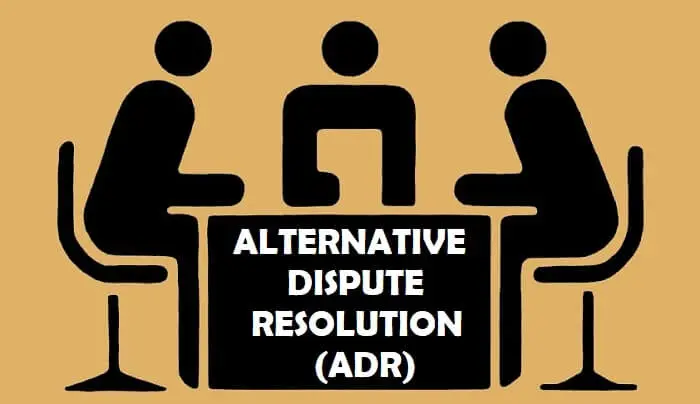Alternative Dispute Resolution (ADR) Is A Speedier And More Economical Alternative To The Traditional Method Of Litigation. It Can Significantly Discharge The Pressure On The Indian Judiciary By Resolving Cases Without Any Intervention Of The Courts. The Alternative Dispute Resolution Mechanism Comprises Scientifically Developed Techniques That Allow Indian Courts To Resolve The Huge Number Of Pending Cases. ADR Extends To All Types Of Matters Including Civil Cases, Commercial, Industrial Disputes, Family Disputes, Etc.
Alternate Dispute Resolution Mechanism
Arbitration
It Can Be Invoked If The Parties Had Signed An Arbitration Agreement Or Inserted An Arbitration Clause In The Original Agreement. Under This Technique, The Dispute Is Referred To An Arbitrator Or Arbitrators Who Pass The “Arbitral Award” Which Is Binding On Both The Parties And Enforceable In The Court Of Law.
Mediation
It Is A Negotiation Technique Where The Mediator Helps The Parties To Communicate And Reach An Agreement That Is Binding On Both Parties. Mediation Helps Both Parties Resolve The Dispute Without Jeopardizing The Business Relationship.
Conciliation
It Is A Form Of Arbitration That Is Non-Adjudicatory. Both Parties Can Initiate Conciliation By Mutual Consent. The Conciliator Assigned Will Hear Both Sides And Passes The Order Which Is Equivalent To An “Arbitral Award”. It Is Binding On Both The Parties And Enforceable In A Court Of Law.
History of Alternate Dispute Resolution in India
Alternative Dispute Resolution Has Been Incorporated Into The Indian Judicial System Based On The Fundamental Rights Enshrined In The Constitution Of India Under Article 14 And Article 21 Dealing With The Right To Equality Before Law And Right To Life And Personal Liberty Respectively. ADR In India Has Evolved Over Time With New Enactments And Amendments.
The Arbitration Act, Of 1961 Was Enacted After India Gained Independence Repealing The Earlier Arbitration Act Of 1940.
Then “The Arbitration And Conciliation Act, 1996” Was Introduced Which Repealed And Replaced The Arbitration Act, Of 1961. This Act Has Been Further Amended Three Times In 2015,2019 And 2021 Respectively.
The Legal Services Authority Act,1987 Was Enacted To Provide Legal Support To The Underprivileged And Poor Section Of The Society To Ensure That Speedy Justice Is Served. Lok Adalats And National Legal Services Authority (NALSA) Was Established By This Act.
The 1999 Amendment (W.E.F. 2002) In The Code Of Civil Procedure, 1908 Inserted Section 89 Which Calls For The Settlement Of Disputes Outside The Court. It Directs The Courts To Examine If There Are Elements Of A Settlement And Then Refers To The Same After The Due Procedure For Any Of The Modes Of ADR; Arbitration, Conciliation, Mediation, And Lok Adalats. These Acts And Amendments Have Paved The Way For ADR In India Which Is Beneficial For The People And The Judicial System As Well.
Advantages of Alternate Dispute Resolution

Faster Procedure
The Process Is Much Less Time-Consuming And People Can Resolve Their Issues Within A Short Span Of Time As Compared To The Conventional Method Of Litigation.
Affordable
The Procedure Of Litigation Involves A Lot Of Expenditure Which Can Be Considerably Cut Down By Settling The Disputes Through Alternate Dispute Resolution Mechanisms.
Simpler Procedure
The Technicalities Involved In ADR Are Much Lesser Than That Of The Court Proceedings Which Makes It More Convenient For The People To Approach, They Have The Liberty To Express Themselves Without Any Fear Of The Court.
Amicable Resolution
ADR Is Very Efficient As It Can Settle Disputes While Preserving The Best Interest Of Both Parties And Preventing Further Conflicts.
Reduced Pendency In Court
It Has Proved Beneficial For The Judicial System Also As In The Passing Years The Lok Adalats Have Cleared A Number Of Pending Cases.
The People Have Started Turning To ADR More Due To The Benefits Attached To It Which Prevents More Burden On The Judiciary.
Problems with Present Alternate Dispute Resolution System
In Spite Of These Developments And After Decades Of Passing The Acts, ADR In India Has Not Taken A Place As A Mature Alternative To Court-Based Litigation.
The Continuous Interference Of The Courts Without Respecting The Party’s Autonomy Has Made The Process More Expensive And Time-Consuming. The Award Is Expected To Be Challenged And Reviewed By The Higher Courts Which Does Not Really Encourage The Parties To Go For Arbitration. The Amendments Introduced In The Arbitration And Conciliation Act, 1996 In Recent Years Indicate The Need For Reforms To Establish ADR Specifically Arbitration As A Viable Alternative To Litigation. There Is No Official Code Of Conduct, Or A Regulatory Body For The Arbitrators, Conciliators, Or Mediators Which Gives Them Unprecedented Autonomy Making The Process Less Reliable And More Prone To Corruption, And Unethical Practices. Considering The Benefits Of ADR If Implemented Well It Becomes Integral To Find A Solution.
A Strong Institutional Culture Is Needed Which Can Make The Process More Reliable. The Government Of India Is Taking Steps To Promote ADR As A New Delhi International Arbitration Centre Was Established In 2019 Replacing The International Centre For Alternate Dispute Resolution. It Is An Autonomous Body That Will Conduct Arbitration, Conciliation, And Mediation. The Recent Amendment Of 2021 Has Included Provisions For The Qualification Of Arbitrators Based On The Regulations Of The Arbitration Council Of India To Make It More Trustworthy And Omitted The Schedule VIII Which Will Surely Give Flexibility To The Arbitration Council Of India To Lay Down Rules.
However, The Provision For An Unconditional Stay On The Operation Of Arbitral Award Might Turn Out To Be A Regressive Step But The 2021 Amendment Is Indeed Convivial And Has All The Potential To Make India A Pro-Alternative Dispute Resolution Regime.
Rise of Online Dispute Resolution in India

Online Dispute Resolution Is Increasingly Finding Its Place In The Indian Context. Online Dispute Resolution Is An Amalgamation Of Online Platforms And Alternative Dispute Resolution Mechanisms. It Provides Convenience And Faster Dispute Resolution To Both Parties. Due To COVID And The Sudden Increase In Adoption Of Digital Mediums, Online Dispute Resolution Has Taken Exponential Growth In The Last Two Years With Individuals And Businesses Considering It As The Preferred Alternative To Court-Based Litigation.
WeVaad Is An Online Dispute Resolution Institution That Provides Arbitration, Mediation, And Conciliation Services On Our Platform. We Have An Experienced Panel Of WeVaad Experts Who Acts As Arbitrators/Mediators/Conciliators And Helps You In Faster And More Economical Dispute Resolution. The Detailed Offering Is Available On The “Online Dispute Resolution” Page.
If You Have A Legal Dispute And Looking For A Faster Resolution, Please Connect With Us.

